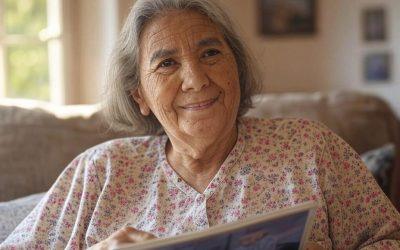The Invisible Line Between Grief and Depression
When Maria lost her father, she expected sadness, but she didn’t expect the emptiness that followed. Some days, she found herself laughing at old memories, while on others, she couldn’t get out of bed. At first, she thought it was normal—grief is unpredictable, after all. But as months passed, her world stayed gray. Unlike the ebb and flow of grief, her sadness never lifted. Even the things she once loved felt meaningless. Was this still grief, or was she slipping into something deeper?
Her experience highlights a question many face after loss: Where does grief end and depression begin? Though they share many symptoms, grief and clinical depression are not the same. Recognizing their differences is key to effective healing and knowing when to seek support.
“I kept telling myself, ‘Time will fix this,’ but the emptiness wouldn’t budge. Learning the difference between normal mourning and deeper despair finally helped me find the support I needed.”
When Sadness Transcends Time

How Grief and Depression Overlap – and Where They Differ
Grief and depression share deep sadness, emotional numbness, fatigue, and changes in sleep or appetite. Yet, the key difference lies in how these feelings manifest and evolve over time:
Emotional Waves vs. Persistent Sadness
- Grief often comes in waves. One moment can bring overwhelming sorrow, then a memory sparks comfort or laughter.
- Depression remains constant. A lingering sense of despair weighs you down, unaffected by distractions or positive moments.
Sense of Self-Worth
- Grieving individuals typically preserve self-esteem. They may feel lost without their loved one but do not see themselves as worthless.
- Depression involves self-loathing or feelings of worthlessness—people may believe they’re a burden or undeserving of care.
Response to Social Support
- Grief can find relief through connection—sharing memories or receiving compassion often eases sorrow, at least briefly.
- Depression leads to withdrawal, where even loved ones’ presence doesn’t alleviate the sense of isolation.
Hope vs. Hopelessness
- Grief holds onto hope. Over time, the bereaved learn to weave their loss into life, finding ways to honor it while moving forward.
- Depression fosters hopelessness, making the future appear meaningless or bleak, with no light at the end of the tunnel.
Signs That Grief May Be Turning into Depression or Complicated Grief
Grief is personal, but certain patterns suggest it may have evolved into complicated grief (prolonged grief disorder) or clinical depression:
🔹 Signs of Complicated Grief
✅ Persistent, Intense Longing: Unable to accept the loss, even after a year.
✅ Preoccupation with the Deceased: Constantly thinking about them in a way that disrupts daily life.
✅ Avoidance of Reminders: Refusal to discuss the person or avoidance of places linked to them.
✅ Emotional Numbness or Bitterness: Feeling stuck, unable to adapt emotionally.
✅ Inability to Function: Struggling with work, relationships, or self-care due to overwhelming grief.
🔹 Signs of Clinical Depression
✅ Loss of Interest in Everything: Even unrelated activities feel empty.
✅ Feelings of Worthlessness: Persistent negative self-view, shame, or guilt.
✅ Prolonged Emotional Numbness: A pervasive disconnection lasting months or years.
✅ Suicidal Thoughts: A sense that life is not worth living.
✅ Physical Symptoms: Headaches, stomach problems, or chronic pain reflecting deeper emotional distress.
When intense grief continues past a year, severely impairs daily functioning, or includes suicidal thoughts, seeking professional support is crucial.
“Grief is the echo of love, reminding us that even in absence, the bond remains alive.” — Emilia F.
When to Seek Help—and How to Cope
🚨 When to Seek Help
✔️ If grief remains severe beyond a year with no relief.
✔️ If daily tasks (work, self-care) become unmanageable.
✔️ If suicidal thoughts or self-harm emerge.
✔️ If social withdrawal grows extreme and persistent.
🌱 Strategies for Coping with Grief and Depression
Allow Yourself to Grieve
- Suppressing feelings prolongs suffering. Therapy, open discussions, or journaling help release emotions.
Build Rituals of Remembrance
- Honor loved ones with meaningful gestures—lighting a candle on special dates or creating memory books. It transforms longing into a tangible tribute.
Seek Social Support
- Isolation worsens sorrow. Connecting with local or online groups offers empathy and shared insight.
Engage in Healthy Routines
- Regular sleep, mindful exercise, and balanced meals anchor you when emotions feel turbulent.
Consider Professional Help
- Therapy (Cognitive Behavioral Therapy, for instance) guides you through overwhelming sadness or negative thought patterns.
- Medication may help if clinical depression is diagnosed, aiming to rebalance brain chemistry.
Things To Try This Week!
Share a Memory with a Loved One
- Recall a positive or humorous story about the person who passed. Whether in person or through a message, these recollections soothe the heart.
Nightly Reflection
- Dedicate five minutes before bedtime to note one dominant feeling of the day—whether sadness, gratitude, or relief. Recognizing emotional shifts can help you see where grief might be veering into deeper despair.
Community Connection
- If you suspect your sorrow leans into depression or complicated grief, check out local or virtual grief circles. Hearing others’ experiences and sharing your own can break the cycle of loneliness and self-doubt.
Conclusion
The Path To Healing
Though grief and depression can appear alike, they diverge in how deeply they erode one’s hope and sense of self. Grief, for all its pain, allows for movement and growth over time; depression can trap individuals in persistent darkness.
Knowing how to differentiate between the two is vital for seeking timely, proper support—be it personal reflection, communal support, or professional intervention. Healing doesn’t mean leaving love behind; it means learning to carry it in a healthier, forward-facing way. 💙
Differentiating grief from depression isn’t always clear, especially when both weigh so heavily on the heart.
Remember: it’s not time alone but the care you invest in your emotional health that truly fosters healing. Explore our cherish collections below for thoughtful resources, creative commemorations, and supportive connections—helping you navigate sorrow’s depths and find steady ground beyond loss.
More Reflections, More Growth
Embracing Hope: Healing Beyond Loss and Lasting Sadness
When the line between grief and depression blurs, seeking clarity and comfort becomes vital. Our All Things Cherish collection holds gentle guidance, soul-nurturing ideas, and a compassionate community that walk beside you on the path toward renewed emotional balance, even in the midst of profound sorrow.
Loss is complex, and the road to healing is different for everyone. These reflections offer insight, support, and guidance as you navigate this journey.
Sometimes, I Still Expect to See Him There—A Reflection on My Turtle’s Presence
Celebrate the life of your loved one with the Dichroic Sea Turtle Cremation Ash Figurine. Handcrafted with care, this figurine infuses your loved one’s ashes into a beautiful sea turtle, symbolizing longevity, patience, and love. A unique way to keep them close to you.
I Still Catch Myself Listening for Him—A Reflection on Grandpa’s Presence
Honor your loved one’s memory with a unique Tree of Life crafted from over 300 feet of wire and a 3” Tranquil Swirl Orb infused with their cremains. This memorial piece is a symbol of enduring love, providing comfort and peace through a beautiful work of art.
When Grief Weighs on Mind, Body, and Spirit: Understanding the Silent Toll of Loss
Grief touches every part of us—the mind, body, and spirit. From cognitive fog to broken heart syndrome, this guide explores the full spectrum of grief’s effects and offers insights into how we can heal and carry the weight of our loss.
Debunking the “Time Heals All Wounds” Myth: Transforming Grief Through Active Healing
Grief doesn’t fade with time—it requires active participation and healing. Learn why “time heals all wounds” is a myth and how engaging in grief through expression, ritual, and support can lead to true emotional recovery.
Thoughtful Gifts for Grandma: The Little Things That Mean the Most
Find the perfect gifts for Grandma that reflect your love and appreciation. From heartwarming jewelry to keepsake boxes and personalized photo albums, discover thoughtful gifts she will cherish for years.
Adventures with My Brother: Gifts That Keep the Journey Going
Celebrate your adventurous brother with gifts that keep the journey going. From personalized journals to survival kits, discover perfect presents for the one who never stays still.
Gifts for the Brother Who Feels Every Beat: The Ultimate Music Lover’s Collection
Discover the perfect gifts for music enthusiasts. From a guitar table lamp to noise-canceling headphones, find the ideal presents to enhance any music lover’s collection.
Thoughtful Gifts for Dad: Because He Deserves to Relax, Too
Shop the ultimate comfort and relaxation gifts that are perfect for unwinding after a long day. From massagers to cozy pillows, these products are sure to provide the relaxation and peace everyone deserves.
The Ultimate Outdoor & Survival Gifts for Dad: Gear Built to Last
Explore top-quality outdoor survival gear, camping essentials, and tactical products that will elevate your next adventure. From portable solar panels and survival kits to tactical backpacks and outdoor cooking tools, gear up for your outdoor journeys.
Explore Journeys of Healing and Solace:
Discover dedicated spaces that offer understanding, guidance, and connection through grief. From the loss of loved ones to life’s challenging transitions, each category provides a pathway to reflect, connect, and find peace in shared experiences.


























